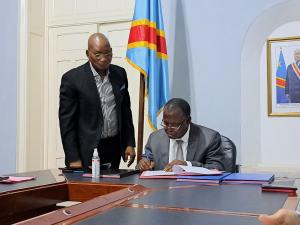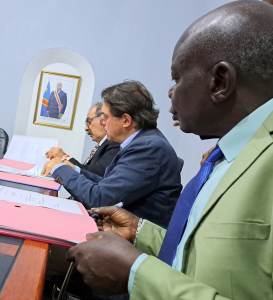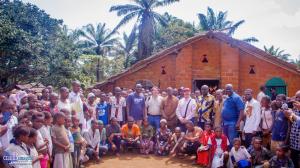Bioeconomy Signs Globally Significant Peatlands, Forest Carbon & Biodiversity Protection Project in DRC

H.E. Boloko Bolumbu Bobo, Governor of Equateur Province signing the agreement in Mbandaka, Democratic Republic of Congo
Bioeconomy will work to defuse a potential major 'carbon bomb' in the Democratic Republic of Congo's Province of Equateur
Considered by many to be the “lungs of the world” Congo’s peatlands are severely threatened by oil and gas exploitation as well as human encroachment for agriculture. Threatened peatlands are referred to as a ‘carbon bomb’ because we not only risk losing their ability to remove millions of tonnes of carbon from the atmosphere each year, but degraded peatlands become a source of greenhouse gas emission themselves, pushing us closer to a catastrophic tipping point.
The landmark agreement between the Province of Equateur, Bioeconomy, WATICO and Société Environnementale de l'Équateur was signed in the DRC. It will establish forest, peatlands, and biodiversity monitoring and protection, develop land use plans, and promote sustainable agriculture and forest management practices. It also includes a mechanism for tracking and verifying emissions reductions, which will be used to generate carbon credits. Most importantly the agreement will deliver significant local community benefits from its focus on higher quality carbon credits.
Bioeconomy’s Chief Conservation Officer and Head of Africa, Dr Paul Elkan, renowned conservationist, represented the company at the signing of the agreement with the partners Société Environnementale de l’Équateur and WATICO and H.E. Boloko Bolumbu Bobo, Governor of Equateur Province in the regional capital, Mbandaka.
"This is a globally significant agreement, and I am pleased that Bioeconomy’s extensive experience in peatlands carbon sequestration projects can help to deliver benefits for the communities in Equateur Province," said Dorjee Sun, Chief Executive of Bioeconomy. "With carbon finance, we can make a positive impact on the lives of the communities in Equateur and the region’s rich biodiversity supports opportunities in genomic mapping for new discoveries in medicine and scientific research with benefits flowing to the people of Equateur. Putting nature at the heart of the value equation is the best way to create a virtuous circular economy, that is the Bioeconomy model.”
He continued, “We are committed to ensuring that Equateur is one of the most authentic, transparent, and highest quality wetland forestry carbon sequestration and biodiversity protection projects in the world. We are faced with a tremendous opportunity to make a significant contribution in the global fight against climate change through this agreement.”
The JNR agreement in the DRC is a significant step towards achieving global climate goals and protecting one of the world's most important peatland and forest ecosystems and its biodiversity. It demonstrates the power of collaboration between governments and the private sector in addressing the world's most pressing environmental challenges.
Media Team
Bioeconomy
media@bioeconomy.co
Visit us on social media:
Twitter
LinkedIn
Legal Disclaimer:
EIN Presswire provides this news content "as is" without warranty of any kind. We do not accept any responsibility or liability for the accuracy, content, images, videos, licenses, completeness, legality, or reliability of the information contained in this article. If you have any complaints or copyright issues related to this article, kindly contact the author above.


